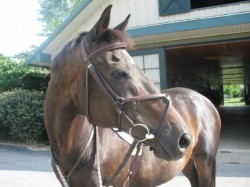APE Spring 2016 Newsletter
Spring 2016 Newsletter
Welcome to spring! We hope everyone has been surviving the weird weather we have been having and wanted to update you on some recent equine health developments in Pennsylvania. Good luck with the upcoming show/trail/riding season!
FYI – Sue will be out of the office on June 2 & 3 if you have any billing or medication orders that you need taken care of. Please call the office if you have any questions – 610.351.1404
Check out Dr. Gina’s patient case studies in our ACUPUNCTURE News section of our site for an inside look at her patients and their success!

Equine Infectious Anemia Confirmed in PA
On April 20, the PA Department of Agriculture (PDA) announced a quarantine of a barn in Halifax after a horse tested positive for Equine Infectious Anemia (EIA) on April 18. This is the first confirmed positive horse in the state in 10 years. There are 19 other horses on the premises that are under quarantine. This will be in effect for at least 60 days. Another 13 horses at that facility is also under quarantine.
EIA in infected horses can cause a variety of symptoms in horses. Some horses have a fever, swollen legs, and loss of strength. Many horses have no signs, but have virus circulating in their blood. These horses infect other horses through biting insects.
This outbreak illustrates the importance of annual Coggins testing of horses that are in contact with other horses-boarding facilities, show horses, sale horses, etc. There is no cure of the virus; thus, the US is trying to eradicate the disease. Positive horses are required to be destroyed or live in life long quarantine. For more information, please visit www.agriculture.pa.gov or contact our office.
EHV-1 Outbreak Updates
There has been a lot of activity with the neuropathic EHV-1 (Equine Herpes Virus-1) disease in the past month.
- The Doylestown boarding facility has been released from quarantine. 3 horses that are separate from general population remain under quarantine. The premise was under quarantine for 49 days. The owners and management of the farm has complied with all requirements and recommendations.
- The PARX racetrack announced on April 2 that a neurologic horse tested positive for neuropathic EHV-1. All new cases have been in the quarantined barns. Four out of the five confirmed cases are deceased. The situation continues to be managed.
- There was one confirmed fatal case in Bedford County, unrelated to any current outbreaks. This case was the wild-type strain of EHV-1, not the neuropathic strain of the above listed outbreaks. It is in a small personal stable with 5 more exposed riding mules. The premise is under PDA quarantine.
Just a reminder, there is NO vaccination for neuropathic EHV-1. The best defense is a good biosecurity program. Please contact us to help put together a good program for your farm! Check out this biosecurity article for a free biosecurity quiz. For real time updates on EIA, EHV-1, and other reportable diseases in the US, visit the Equine Disease Communication Center website.

Emergency Preparedness
As the last of the Pocono wildfire is extinguished in the much needed rains, we are reminded that we are not immune to the threats of Mother Nature. Your emergency may not be as dramatic as a historic brush fire. It could be a simple need to transport for urgent medical care. The question remains: Are you ready to handle this?
First and foremost, your horse needs to load in a trailer, preferably ANY kind of trailer. It needs to load quickly and without a fuss. This is ESPECIALLY important if you do not own a trailer. If you own a trailer, keep it maintained and easily accessible. Finding the tires flat and plowed in behind 10 foot snow drifts is not helpful in an urgent situation. If you do not own a trailer, who do you call? As veterinarians, we are not responsible for providing transportation for your horse(s) in an emergency but are often asked to coordinate hauling to a care facility. START NOW!! Talk to your neighbors, local boarding facilities, or commercial haulers in the area. Make the arrangements BEFORE the horse gets ill i.e. IF my horse needs help, CAN/WILL you help me? It is also helpful to have a back-up if they are not available. Also, be prepared to compensate them for their time and gas required to haul your horses. If you are relying on commercial haulers, inquire about their emergency policies. If you need to evacuate due to an emergency where are you going and how are you getting there? Network with your horse community and work out who may be able take horses in temporarily in case of an emergency. As a horse owner, keep your horse current on vaccinations and consider a Coggins test to make it easier to move the horse across state lines if needed. Make sure your horse has good ground manners and can be led safely in most situations.
In emergency situations, minutes count. It is imperative that you have a plan and the ability to put it in play to optimize your horses’ chances of survival. For more information, please see this online PDF for the UC Davis Emergency Preparedness guide.
You can also contact our office for more information. Stay safe out there!
